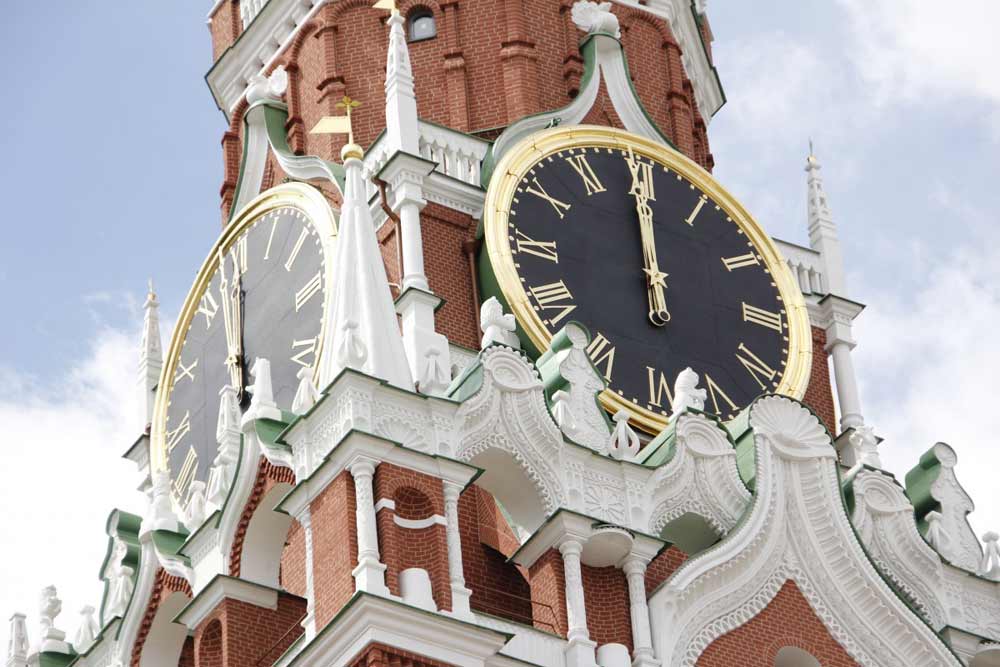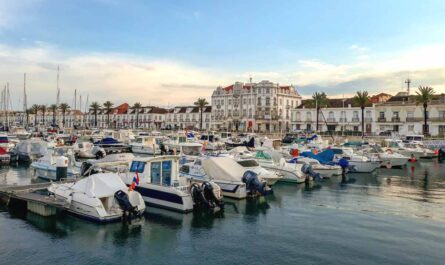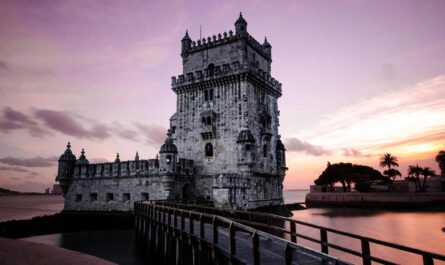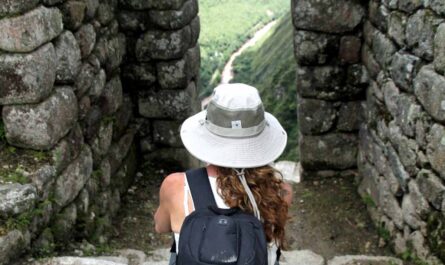What are some of the interesting facts about Albania? Nestled in the heart of the Balkans, Albania is a nation of rugged beauty and rich history, offering a captivating blend of ancient traditions and stunning landscapes. Bordered by Montenegro to the northwest, Kosovo to the northeast, North Macedonia to the east, and Greece to the south, with its western coast lapped by the azure waters of the Adriatic Sea, Albania boasts a strategic location that has influenced its history for millennia. From the ancient Illyrians to the Romans, Byzantines, and Ottomans, Albania has been shaped by a tapestry of cultures, each leaving its mark on the country’s identity. In this article, I will talk about some interesting facts about Albania.
Interesting Facts About Albania: History, Culture, Travel
Today, Albania stands as a testament to resilience, having emerged from decades of isolation to embrace democracy and strive for economic prosperity. Visitors are drawn to its pristine beaches along the Albanian Riviera, its rugged mountains ideal for outdoor adventures, and its wealth of archaeological sites, including the ancient city of Butrint, a UNESCO World Heritage Site. With a warm hospitality that welcomes travelers from around the globe, Albania invites exploration and discovery at every turn. Here are some interesting facts about Albania:
1. Festive Revelry: Carnaval Celebrations in Albania
Albania’s cultural tapestry is woven with vibrant threads of carnival celebrations, a kaleidoscope of color, music, and tradition that unfurls across its diverse regions, particularly during February. Amidst the backdrop of picturesque landscapes, locals and visitors alike don resplendent costumes to partake in lively parades that meander through cobblestone streets, reverberating with the infectious rhythms of traditional music. Each region imbues the festivities with its unique flair, from the coastal towns bedecked in maritime motifs to the mountain villages adorned with folkloric intricacies. As the revelry reaches its crescendo, Albania becomes a canvas of joyous expression, where the spirit of Carnaval infuses every heart with merriment and camaraderie.
2. Majestic Avian Spectacles: Eagle Watching in the Albanian Alps
Nestled within the rugged embrace of the Albanian Alps lies a sanctuary for birdwatchers, where the boundless skies serve as a theater for nature’s grandeur. Amongst the craggy peaks and verdant valleys, majestic golden eagles take flight, their graceful silhouettes tracing arcs against the azure expanse. Enthusiasts from far and wide flock to this avian hotspot, their eyes alight with the anticipation of witnessing these regal creatures in their natural habitat. With each soaring glide and piercing gaze, the golden eagles bestow upon onlookers a glimpse into the untamed beauty of Albania’s wilderness, forging an indelible connection between humanity and the sublime forces of nature.
3. Alpine Wonderland: Exploring Albania’s Mountain Majesty
Embarking on a journey through Albania unveils a landscape dominated by rugged peaks and undulating valleys, with approximately 70% of the country’s terrain cloaked in majestic mountains. For hikers and nature enthusiasts, this mountainous expanse offers an unparalleled opportunity to immerse oneself in the raw splendor of nature. Towering summits pierce the cerulean sky, while verdant slopes cascade into pristine valleys below. Each trail blazed through this alpine wonderland leads to vistas of breathtaking beauty, where panoramic views stretch as far as the eye can see, inspiring awe and reverence in equal measure. From the snow-capped peaks of the Accursed Mountains to the verdant slopes of the Southern Albanian Alps, Albania’s mountain majesty beckons adventurers to traverse its paths and discover the untamed beauty that lies within.
4. Cultural Tapestry: Greek, Roman, and Illyrian Influences in Albania
Albania’s cultural landscape bears the indelible imprint of ancient civilizations, with the Illyrians, ancient Greek colonies, and the Roman Empire all leaving their mark on its rich tapestry of history and heritage. From the vestiges of Illyrian settlements to the enduring legacy of Hellenistic and Roman architecture, Albania serves as a palimpsest of cultural fusion, where the echoes of bygone eras resonate through the ages. Traces of Greek and Roman influence can be found in the ruins of ancient cities, the architectural marvels of temples and amphitheaters, and the intricate mosaics that adorn archaeological sites. As custodians of this eclectic legacy, Albania’s cultural heritage stands as a testament to the enduring legacy of civilizations past, forging connections across time and space that unite the past with the present.
5. The Expanding Albanian Diaspora
The dispersion of Albanians across the globe stands as a testament to the intricate interplay of historical circumstances and contemporary economic realities. Stemming from a tumultuous past marked by political upheaval and socio-economic challenges, the Albanian diaspora has taken root in various corners of the world, notably in Europe and North America.
Driven by a quest for better opportunities and a longing for stability, Albanians have sought refuge and prosperity beyond the confines of their homeland. From the bustling streets of New York City to the tranquil villages of Switzerland, communities of Albanian expatriates thrive, preserving their cultural heritage while adapting to the rhythms of their adopted homelands.
6. Exploring Albanian Onomastics: A Window into Heritage
In the intricate tapestry of Albanian culture, surnames serve as poignant markers of familial lineage and tradition. Rooted in the patronymic tradition, Albanian surnames derive from the father’s name, reflecting a deep-seated reverence for familial ties and ancestry. Each surname carries a unique story, a thread connecting past, present, and future generations in an unbroken chain of identity.
From the ubiquitous “Krasniqi” to the melodious “Zogaj,” Albanian onomastics abound with diversity and significance. Through the study of surnames, one can unravel the complex web of kinship networks and regional affiliations that define Albanian society, offering a glimpse into its rich cultural tapestry.
7. The Sacred Code of Beshë: Upholding Albanian Values
At the heart of Albanian tradition lies the ancient code of Besa, a sacred oath imbued with profound significance. Embedded within the fabric of Albanian society, Besa epitomizes the values of hospitality, loyalty, and unwavering integrity. Rooted in centuries-old customs, this code of honor serves as a guiding light in navigating the complexities of human relationships.
To uphold Besa is to honor one’s word, to extend hospitality to strangers, and to stand steadfast in times of adversity. It is a testament to the resilience and dignity of the Albanian spirit, transcending borders and generations. In a world fraught with uncertainty, the timeless principles of Besa offer a beacon of hope and solidarity, binding communities together in a shared commitment to honor and integrity.
8. Ottoman Opulence: Albania’s Enduring Legacy of Ottoman Rule
Centuries of Ottoman dominion have left an indelible mark on Albania’s cultural identity, shaping its architecture, cuisine, and social customs in profound ways. From the grandeur of Ottoman palaces to the labyrinthine streets of bazaars and caravanserais, the legacy of Ottoman rule is woven into the fabric of Albanian society. Influences from the Ottoman era permeate every aspect of daily life, from the aromatic spices and flavors of Albanian cuisine to the intricate designs of Ottoman-style mosques and hammams. As custodians of this rich heritage, Albanians honor their Ottoman legacy with pride, preserving and celebrating the traditions and customs passed down through generations, ensuring that the spirit of Ottoman opulence continues to thrive in the modern era.
9. Relics of a Bygone Era: Albania’s Bunker Landscape
Scattered across the Albanian landscape like silent sentinels are over 750,000 concrete bunkers, enduring relics of a bygone era marked by Cold War paranoia and geopolitical tensions. Constructed during the communist regime of Enver Hoxha, these bunkers were intended to serve as a bulwark against potential invasion or attack. Today, these bunkers stand as mute witnesses to Albania’s tumultuous past, their weathered facades bearing testament to a chapter in history defined by isolation and ideological fervor.
Despite their utilitarian origins, these bunkers have become a symbol of Albania’s resilience and fortitude, serving as a reminder of the country’s ability to endure adversity and emerge stronger in the face of adversity.
10. Regal Emblem: The Double-Headed Eagle of Albania
At the heart of Albania’s national identity lies the double-headed eagle, a symbol steeped in history and imbued with profound meaning. Adorning the country’s national flag and coat of arms, this majestic creature serves as a potent emblem of strength, resilience, and unity. With wings outstretched and talons poised, the double-headed eagle embodies the indomitable spirit of the Albanian people, who have weathered centuries of adversity with unwavering resolve.
Rooted in ancient heraldry and folklore, this iconic symbol stands as a testament to Albania’s enduring legacy, a beacon of national pride that unites its citizens and resonates with the spirit of independence and freedom.
11. Echoes of Antiquity: Albania’s Ancient Heritage
Delving into the annals of Albania’s history unveils a tapestry woven with threads of ancient heritage, where traces of human settlement date back to the Paleolithic era. Across the rugged terrain, remnants of ancient civilizations bear witness to the country’s long and storied past, offering glimpses into the lives of those who once walked these hallowed grounds. From the enigmatic ruins of Butrint, a UNESCO World Heritage Site, to the towering fortifications of Gjirokastër, Albania’s ancient heritage is etched into the very fabric of its landscape. As visitors trace the footsteps of past civilizations, they embark on a journey through time, where the echoes of antiquity reverberate through the ages, reminding all who tread upon Albanian soil of the enduring legacy of its people.
12. Savoring Albanian Espresso Culture
In the bustling cafes and vibrant social scenes of Albania, the aromatic allure of strong espresso beckons aficionados and casual drinkers alike. Embedded in the fabric of daily life, the ritual of sipping espresso transcends mere refreshment; it embodies a cultural reverence for bold flavors and convivial camaraderie.
From the quaint cobblestone streets of Tirana to the picturesque promenades of Saranda, the sight of espresso cups clinking in animated conversation is a quintessential Albanian tableau. Whether enjoyed solo as a morning pick-me-up or shared amongst friends over lively debates, the potent brew of Albanian espresso serves as a catalyst for connection and community.
13. A Gastronomic Journey through Albanian Cuisine
Embark on a culinary odyssey through the diverse flavors of Albanian cuisine, where history and geography converge to create a tantalizing tapestry of tastes. Influenced by centuries of cultural exchange and culinary cross-pollination, Albanian dishes reflect a harmonious fusion of Mediterranean freshness, Ottoman richness, and Balkan robustness.
At the heart of Albanian gastronomy lies a reverence for simplicity and seasonality, with fresh seafood, sun-kissed vegetables, and golden olive oil taking center stage. From the succulent skewers of grilled meats to the fragrant pilafs infused with spices, each dish tells a story of tradition and innovation, passed down through generations with pride.
14. Indulging in Xhiro: A Delightful Street Food Tradition
Step onto the bustling streets of Albania and be greeted by the irresistible aroma of freshly baked Xhiro, a cherished national favorite. This savory pastry, enveloped in flaky layers of dough, beckons passersby with its tantalizing fillings of creamy feta cheese, verdant spinach, or savory meat.
Whether enjoyed as a quick snack on the go or savored leisurely with a cup of steaming tea, Xhiro encapsulates the essence of Albanian street food culture. Its humble origins belie its culinary prowess, offering a symphony of flavors and textures that delight the senses and warm the soul. In every bite of Xhiro, one tastes the vibrant spirit of Albania, where culinary tradition meets modern indulgence in perfect harmony.
15. Linguistic Diversity: Albania’s Melting Pot of Languages
Albania stands as a veritable melting pot of languages, where linguistic diversity reflects the country’s rich tapestry of history and heritage. At the forefront is Albanian, an Indo-European language renowned for its unique features and distinctiveness. Serving as the official language, Albanian embodies the cultural identity of the nation, uniting its people under a common linguistic banner. Additionally, Greece, Aromanian, and Macedonian are recognized as minority languages, each adding a layer of complexity and richness to Albania’s linguistic landscape. From the melodic cadences of Albanian to the lyrical rhythms of Greek and the evocative dialects of Aromanian and Macedonian, Albania’s linguistic diversity serves as a testament to the country’s multicultural heritage and spirit of inclusivity.
16. Toasting with Rakija: A Time-Honored Albanian Tradition
In the heart of Albanian festivities, Rakija flows freely, igniting spirits and kindling joyous celebrations. This potent fruit brandy, steeped in tradition and craftsmanship, holds a revered place in Albanian culture as the libation of choice for marking milestones and sharing moments of merriment.
From weddings to religious festivals, Rakija symbolizes the warmth of hospitality and the bonds of camaraderie that unite friends and family. Each sip carries the essence of sun-ripened fruits and centuries-old recipes, infusing gatherings with a sense of conviviality and conviviality.
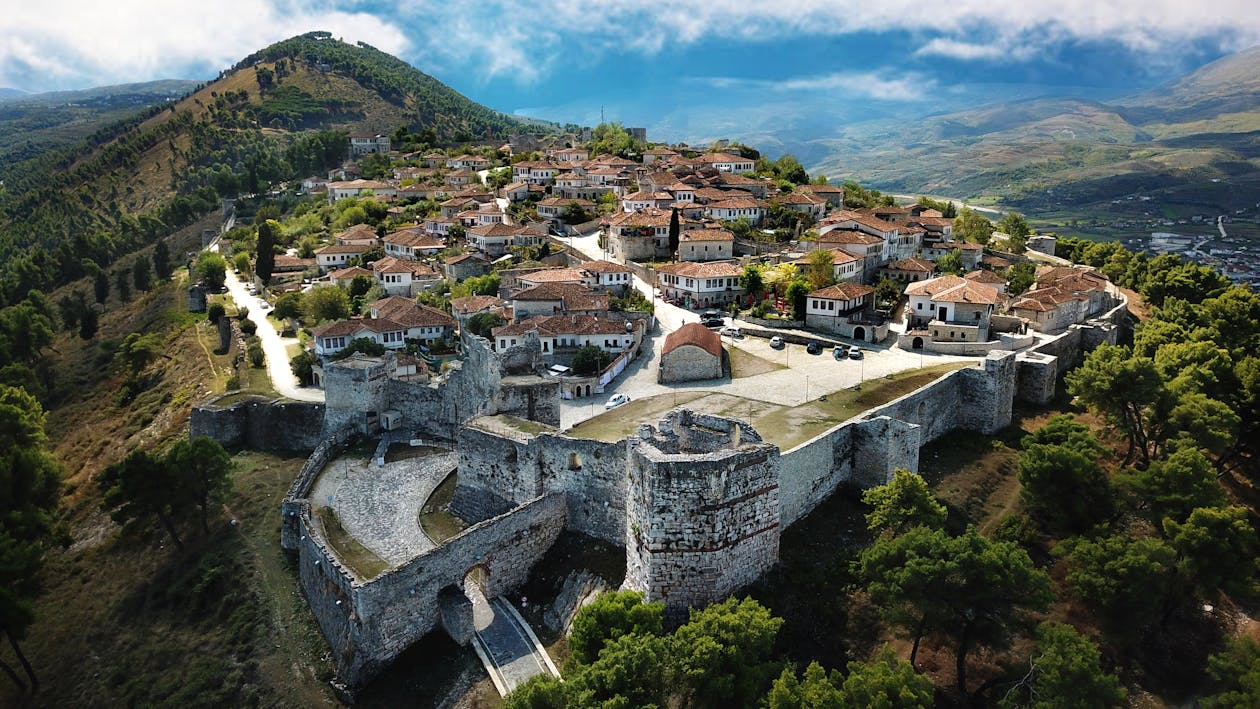
17. Harmonies of the Homeland: Exploring Albanian Music
Albania resonates with the melodious strains of its rich musical heritage, a tapestry woven from centuries of tradition and innovation. From the haunting melodies of iso-polyphonic singing to the infectious rhythms of modern pop, Albanian music captivates listeners with its diversity and depth.
In village squares and urban concert halls alike, musicians channel the soul of the nation through their performances, honoring ancient folk tunes and embracing contemporary sounds. Whether celebrating life’s joys or lamenting its sorrows, Albanian music serves as a cultural touchstone, fostering unity and expression across generations.
18. Preserving Heritage: Albania’s UNESCO Gems
Nestled amid Albania’s rugged landscapes lie treasures of unparalleled historical and cultural significance, recognized by UNESCO as World Heritage Sites. Among these illustrious landmarks are the ancient cities of Berat and Gjirokaster, whose cobblestone streets and Byzantine architecture bear witness to centuries of human endeavor and creativity.
As guardians of Albania’s collective memory, these UNESCO treasures stand as testaments to the country’s rich and diverse heritage, inspiring awe and reverence in all who behold them. From the towering citadels to the labyrinthine bazaars, each site tells a story of resilience and adaptation, shaping the identity of a nation and illuminating its path toward the future.
19. Harmony in Faith: Albania’s Religious Mosaic
Albania emerges as a mosaic of faiths, where religious diversity intertwines seamlessly with the fabric of daily life. As a majority-Muslim country, Islam forms the bedrock of Albania’s religious identity, with a significant portion of the population adhering to the tenets of the faith. However, the country also boasts vibrant Christian communities, including Catholic and Orthodox minorities, who coexist harmoniously alongside their Muslim brethren. Albania’s religious landscape is characterized by a spirit of tolerance and acceptance, where individuals are free to practice their faith without fear of persecution or discrimination. This ethos of religious harmony stands as a beacon of hope and understanding, fostering unity amidst diversity and serving as a model of peaceful coexistence for the world.
20. Basking in the Beauty of the Albanian Riviera
Tucked away along the sun-kissed shores of the Ionian Sea, the Albanian Riviera beckons with its beguiling blend of natural splendor and coastal charm. Stretching languidly beneath azure skies, this picturesque coastline entices travelers with its pristine beaches, crystalline waters, and idyllic coastal towns.
From the bustling promenades of Saranda to the secluded coves of Dhermi, each enclave along the Albanian Riviera offers a unique tapestry of experiences, where sun-soaked days blend seamlessly into starlit nights. Whether lounging on sandy shores or exploring hidden coves by boat, visitors are swept away by the sheer beauty and tranquility of this Mediterranean gem.
21. Thrills and Adventures in Albania’s Outdoor Playground
For adrenaline junkies and nature enthusiasts alike, Albania is a veritable playground of outdoor pursuits and rugged landscapes. From the towering peaks of the Albanian Alps to the untamed rapids of its rivers, the country’s diverse terrain offers endless opportunities for exploration and adventure.
Embark on exhilarating hikes through pristine wilderness, where panoramic vistas and hidden waterfalls await at every turn. Take to the waters for heart-pounding white-water rafting excursions or dive into the depths of crystal-clear lakes and coastal reefs, where vibrant marine life thrives beneath the surface. Whether scaling craggy cliffs or traversing verdant valleys, Albania’s outdoor wonders promise thrills and memories to last a lifetime.
22. Unearthing Ancient Treasures at Butrint
In the heart of southern Albania lies the archaeological marvel of Butrint, a testament to the region’s rich tapestry of history and culture. Designated as a UNESCO World Heritage Site, Butrint boasts a legacy dating back to the 8th century BC, its ruins bearing witness to the rise and fall of civilizations over millennia.
Wander through the ancient streets of Butrint and marvel at the remnants of temples, theaters, and fortifications that once stood as a testament to the city’s prominence in antiquity. From its Hellenistic origins to its later Roman and Byzantine incarnations, Butrint offers a captivating glimpse into the ebb and flow of human civilization in the Mediterranean basin. Amidst the tranquil beauty of its natural surroundings, Butrint stands as a poignant reminder of Albania’s enduring legacy and cultural heritage.
23. The Legacy of Atheism: Albania’s Communist Era
Albania’s tumultuous history is marked by a chapter of ideological fervor and state-imposed atheism during the communist era, spanning from 1941 to 1992. Under the leadership of Enver Hoxha, Albania became the world’s first atheist state, with religion outlawed and religious institutions suppressed. Mosques, churches, and other places of worship were closed, and religious practices were banned.
This period of state-enforced atheism left an indelible mark on Albania’s cultural and social landscape, shaping the collective memory of its people and leaving a legacy of religious tolerance and secularism. Despite the challenges of the past, Albania has emerged as a beacon of religious freedom and pluralism in the modern era, embracing diversity and celebrating the right of every individual to practice their faith freely.
24. Berat: A Glimpse into Ottoman Grandeur
Nestled amidst the rugged landscapes of southern Albania, Berat stands as a living testament to the enduring legacy of Ottoman influence in the region. Dubbed the “City of a Thousand Windows” for its enchanting skyline of whitewashed houses cascading down the hillsides, Berat exudes an air of timeless elegance and architectural splendor.
Stroll through the cobblestone streets of Berat’s historic quarter, where centuries-old mosques, hammams, and caravanserais bear witness to the city’s rich Ottoman heritage. Admire the intricate craftsmanship of the Ottoman-era houses, their facades adorned with ornate wooden balconies and colorful frescoes that tell tales of bygone eras. From the imposing silhouette of the Berat Castle to the tranquil banks of the Osum River, Berat captivates visitors with its blend of natural beauty and cultural treasures.
25. Kruja: Guardian of Albanian History
Perched atop a craggy hilltop in central Albania, Kruja emerges as a bastion of Albanian resistance against Ottoman encroachment, its medieval fortress a symbol of defiance and fortitude. Steeped in history and folklore, Kruja’s storied past unfolds against a backdrop of rugged landscapes and panoramic vistas.
Explore the cobbled streets of Kruja’s old bazaar, where artisans ply their trade amidst centuries-old stone facades and bustling market stalls. Ascend to the heights of Kruja Castle, where the legendary figure of Skanderbeg once rallied his troops in defense of Albanian independence. From the towering minarets of the Ethnographic Museum to the tranquil gardens of the Skanderbeg Museum, Kruja offers a glimpse into Albania’s tumultuous past and enduring spirit of resilience.
26. Skanderbeg: A Hero’s Legacy
In the heart of Kruja lies the birthplace of Gjergj Kastrioti Skanderbeg, the revered national hero whose valiant efforts against the Ottoman Empire have immortalized him in Albanian folklore and history. Born amidst the tumult of medieval Europe, Skanderbeg rose to prominence as a fearless warrior and charismatic leader, rallying his countrymen to stand against the tide of Ottoman conquest.
From his early victories in the mountain strongholds of Albania to his legendary defense of Kruja against overwhelming odds, Skanderbeg’s legacy continues to inspire generations of Albanians to this day. His indomitable spirit and unwavering commitment to freedom serve as a beacon of hope and courage in times of adversity, reminding Albanians of their proud heritage and enduring resilience in the face of adversity. RPM 3.0 – 60% CONVERSION & Money for Affiliate Marketing
27. Tirana: A City of Contrasts and Renewal
Tirana, the dynamic capital of Albania, stands as a testament to the country’s resilience and evolution. In recent years, the city has undergone a remarkable transformation, shedding its communist past to embrace a vibrant blend of history, culture, and modernity.
Venture into Tirana’s bustling streets, where the echoes of the past mingle with the rhythms of contemporary life. Explore the city’s historic landmarks, from the grandeur of Skanderbeg Square to the colorful facades of the Blloku district, once the exclusive enclave of the communist elite. Amidst the maze of narrow alleys and bustling markets, discover hidden gems like the Et’hem Bey Mosque and the vibrant New Bazaar, where centuries of tradition converge with modern flair.
28. Albania: The Affordable Jewel of Europe
For travelers seeking adventure without breaking the bank, Albania shines as a beacon of affordability and value. Compared to its European counterparts, Albania offers a budget-friendly travel experience with a plethora of affordable accommodation options, delectable cuisine at wallet-friendly prices, and a wealth of activities that won’t strain your finances.
Embark on a journey through Albania’s breathtaking landscapes, from the pristine beaches of the Ionian and Adriatic coasts to the rugged peaks of the Albanian Alps. Indulge in mouthwatering local delicacies at family-run tavernas and sip on refreshing glasses of homemade wine without worrying about your budget. Whether exploring ancient ruins, hiking scenic trails, or simply soaking up the sun on a secluded beach, Albania invites travelers to embrace adventure without breaking the bank.
29. Soccer Fever: Albania’s Passionate Football Culture
In the hearts and minds of Albanians, football reigns supreme as the nation’s favorite pastime and source of collective pride. From the fervent chants of fans in packed stadiums to the spirited matches played on dusty neighborhood pitches, football permeates every facet of Albanian culture, uniting communities and transcending social divides.
Join the ranks of passionate football fanatics as you immerse yourself in the electrifying atmosphere of a matchday in Albania. Cheer on the national team, affectionately known as the “Eagles,” as they battle it out on the pitch against fierce rivals. Feel the adrenaline rush as you witness the raw emotion and unbridled enthusiasm of Albanian football fans, whose unwavering support fuels the dreams of glory and victory for their beloved team.
30. Vinicultural Renaissance: Albania’s Emerging Wine Region
Amidst the verdant hills and sun-kissed vineyards, Albania’s wine industry undergoes a renaissance, casting off the shackles of obscurity to emerge as a burgeoning force in the realm of viticulture. Embarking on a journey of oenophilic exploration, enthusiasts discover a treasure trove of indigenous grape varieties, from the robust Kallmet to the aromatic Sheshë, each imbued with the essence of Albania’s terroir. Against the backdrop of convivial gatherings and convivial meals, these local wines regale palates with their complexity and depth, offering a tantalizing glimpse into the vinicultural heritage of the region. As Albania’s wines garner acclaim on the international stage, they stand as a testament to the country’s rich winemaking tradition, inviting connoisseurs to savor the fruits of their labor amidst a landscape steeped in history and hospitality.
